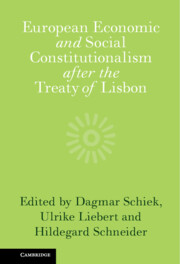Book contents
- Frontmatter
- Contents
- Contributors
- Preface
- Abbreviations
- Table of cases
- Introduction
- Part I European economic and social constitutionalism between norms and practices
- Part II Emanations of tensions between economic and social integration
- 5 Circular migration
- 6 European company regulation between economic and social integration
- 7 Services of general economic interest under EU law constraints
- Part III Studying cases of possible tensions
- Bibliography
- Index
- References
5 - Circular migration
A triple win situation? Wishful thinking or a serious option for a sustainable migration policy?
from Part II - Emanations of tensions between economic and social integration
Published online by Cambridge University Press: 05 July 2011
- Frontmatter
- Contents
- Contributors
- Preface
- Abbreviations
- Table of cases
- Introduction
- Part I European economic and social constitutionalism between norms and practices
- Part II Emanations of tensions between economic and social integration
- 5 Circular migration
- 6 European company regulation between economic and social integration
- 7 Services of general economic interest under EU law constraints
- Part III Studying cases of possible tensions
- Bibliography
- Index
- References
Summary
Introduction
Ten years ago the Lisbon Strategy proclaimed that the EU was to become ‘the most dynamic and competitive knowledge-based economy in the world’. In order to guarantee sustainable economic growth, full employment and an increase of highly skilled labour participants is considered to be essential. Beyond this, international migration must also be regarded in its global context, both socially and economically. From economists’ perspectives, liberalisation of migration will achieve greater welfare benefits than liberalisation of trade in goods and services and of capital flows.
In the light of Europe’s declining fertility rates and an ageing population, the Member States and the EU, specifically in the 2009 Stockholm Programme, have argued in favour of a more demand-driven immigration policy even in a period of economic crisis. At the same time, the idea of temporary and specifically circular labour migration has regained increasing popularity.
- Type
- Chapter
- Information
- Publisher: Cambridge University PressPrint publication year: 2011
References
- 3
- Cited by



